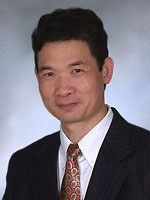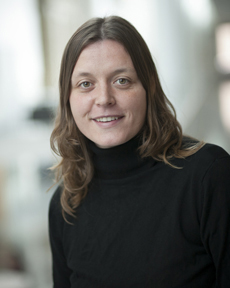Two on faculty receive Presidential Early Career awards
By Krishna Ramanujan


Kenong Xu, assistant professor of horticulture and plant breeding, and Lena Kourkoutis, assistant professor of applied and engineering physics, are two of 105 researchers to receive a Presidential Early Career Award for Scientists and Engineers, the highest honor bestowed by the U.S. government on science and engineering professionals in the early stages of their careers.
They will receive their awards at a Washington, D.C., ceremony this spring.
Xu, who is funded and was nominated by the Department of Agriculture, works to identify apple genes and gene networks that control characteristics such as tree form, resistance to stress, fruit color, acidity and shelf life.
Such insights save apple breeders time and money when they develop new varieties. Breeders can use insights from Xu’s research to identify rapidly which progeny carry desired traits, rather than waiting for apple seedlings to fruit to see if certain traits were passed on. And they can discard undesirable seedlings at a very young stage, greatly reducing costs.
“Xu is demonstrating how we can apply new insights into how plants work to make them more adaptable to a changing world and evolving consumer needs,” says Alan Collmer, director of Cornell’s School of Integrative Plant Science.
Kourkoutis, the James C. and Rebecca Q. Morgan Sesquicentennial Faculty Fellow, receives funds and was nominated by the U.S. Department of Defense. Her work focuses on understanding and controlling nanostructured materials, from complex oxide heterostructures to materials for battery and photovoltaic applications to biological systems.
Her group uses electron microscopy to explore these areas and works to advance existing and develop new electron microscopy techniques. “Lena Kourkoutis’ selection as a Presidential Early Career Awardee is a well-deserved recognition of her outstanding research program to explore the electronic, structural and chemical properties of materials with atomic scale resolution,” said Lois Pollack, professor and director of the Department of Applied and Engineering Physics. “She is interested in many topics, ranging from exploring the origins of unusual properties in atomically engineered materials to understanding why rechargeable batteries fail.”
Awardees are selected for their pursuit of innovative research at the frontiers of science and technology and their commitment to community service through scientific leadership, public education or community outreach. The awards are coordinated by the Office of Science and Technology Policy in the Executive Office of the President.
Media Contact
Get Cornell news delivered right to your inbox.
Subscribe